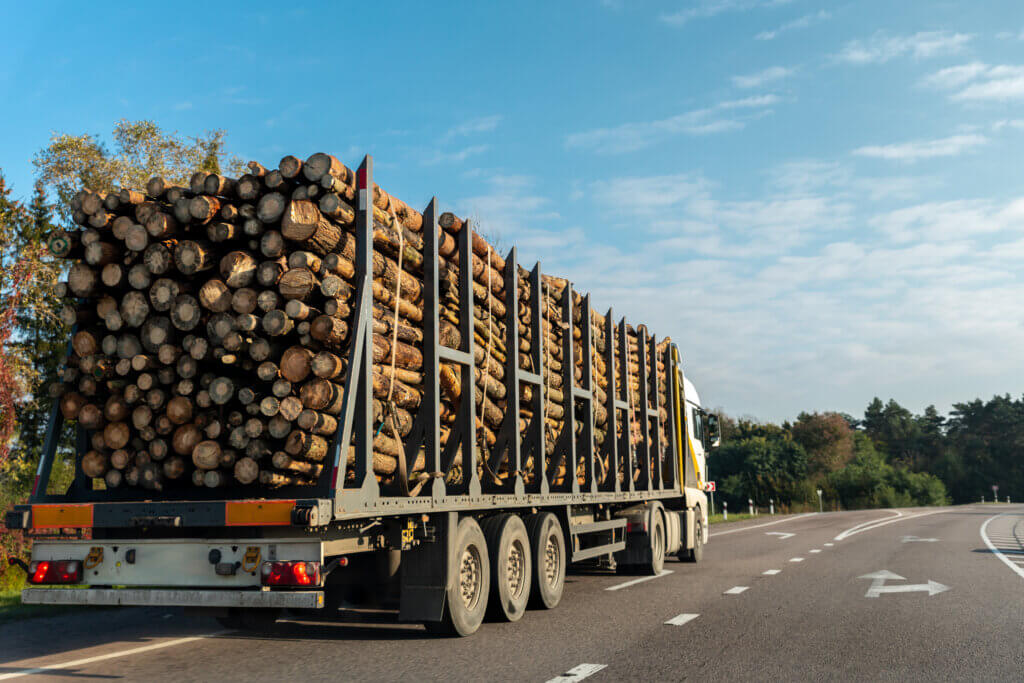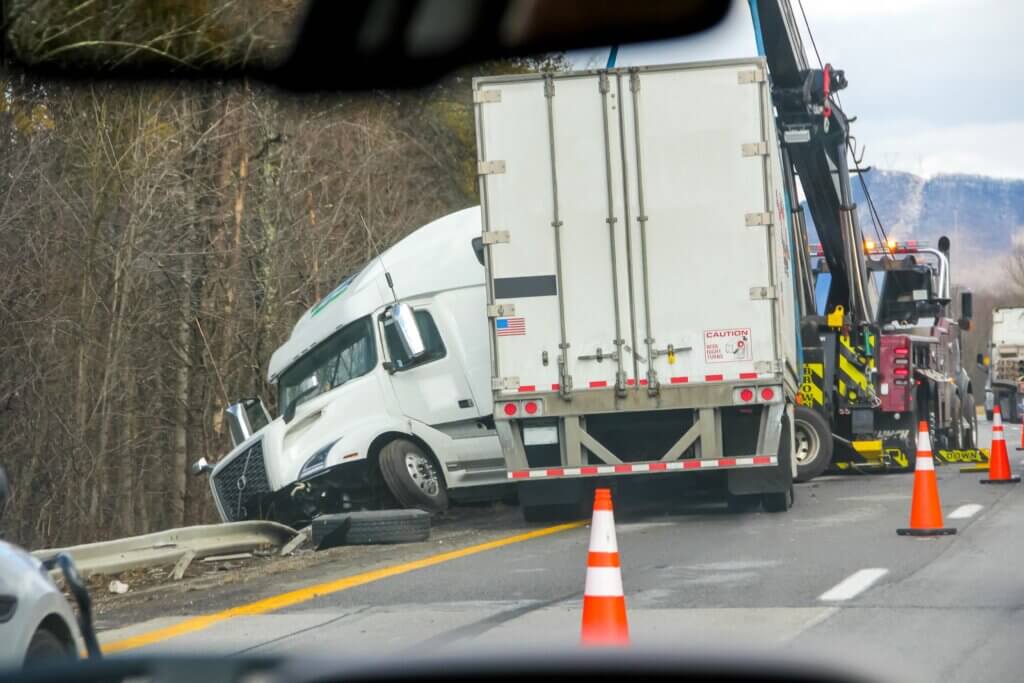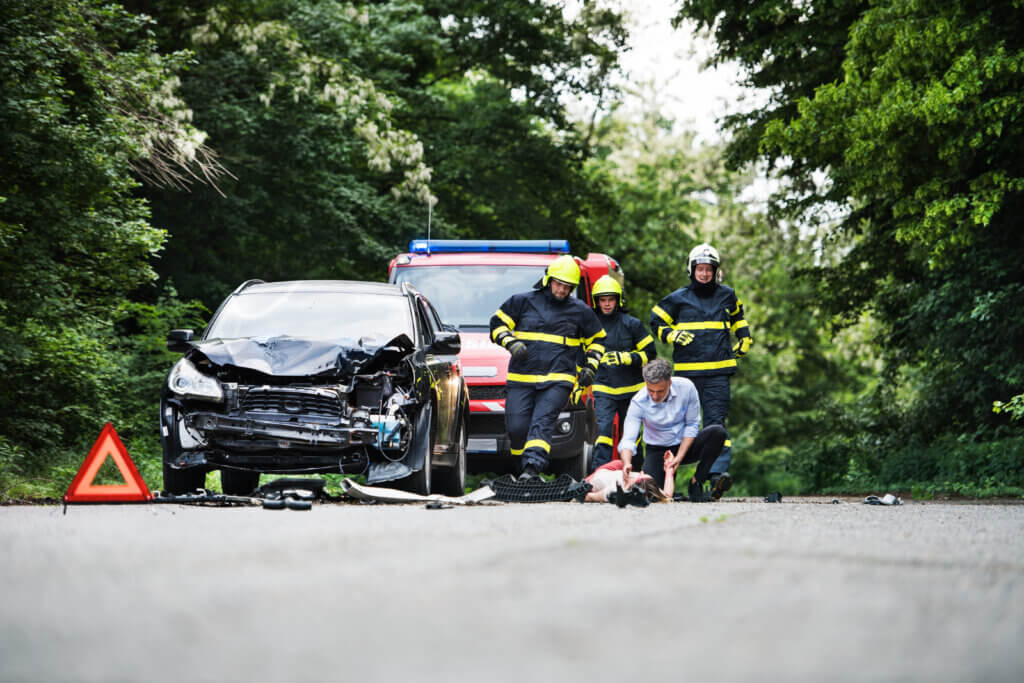If you or a loved one has been injured in a truck crash in Barrow County, the attorneys at Blasingame, Burch, Garrard & Ashley (BBGA) are here to help. Truck accident cases are different from regular car accident claims because they often involve complex laws, multiple parties, and powerful trucking companies and insurers. Our team has decades of experience holding negligent trucking companies accountable.
Call (706) 354-4000 today for a free consultation, or contact us online. There is no charge unless we recover money for you in your case.
- Why Truck Accidents in Barrow County Are Especially Complex
- Truck Accident Statistics in Barrow County, GA
- Common Causes of Truck Accidents
- Why Truck Crashes Are So Dangerous
- Common Injuries from Truck Accidents
- Georgia Laws Trucking Companies Must Follow
- Challenges in Barrow County Truck Accident Cases
- A History of Results
- What to Do After a Truck Accident in Barrow County
- Frequently Asked Questions
- How an Experienced Truck Accident Attorney Can Help
- Contact BBGA Today
Why Truck Accidents in Barrow County Are Especially Complex
Truck accident cases often involve multiple layers of responsibility. Commercial trucks are regulated by both federal and Georgia laws, which cover driver hours, vehicle inspections, load weight, and more. A single crash may involve responsibility from:
- The truck driver
- The trucking company
- Contractors who load cargo or handle maintenance
- Parts manufacturers if a defect is involved
These cases also rely on specialized evidence like driver logbooks, black box data, GPS tracking, and accident reconstruction. Without an experienced legal team, important evidence may be lost.

Truck Accident Statistics in Barrow County, GA
Barrow County experiences a concerning rate of motor vehicle fatalities. Recent public health data shows the county has a motor vehicle crash fatality rate of 21.9 deaths per 100,000 residents, with 18 total reported crash deaths. While not all of these involve large trucks, state data confirms that truck crashes are a persistent problem in Georgia:
- Between 2013 and 2023, Georgia had more than 310,000 truck-related crashes.
- Over 2,000 of these crashes were fatal.
- More than 100,000 people were injured in Georgia truck crashes during that time.
Roads and Highways Where Barrow County Truck Accidents Happen Most
Certain roads in Barrow County see more severe crashes, including those involving large trucks:
- State Route 211 (SR-211) – consistently identified as a high-fatality roadway in Barrow County.
- Connecting routes to I-85 – heavily used by freight carriers traveling between Atlanta and Northeast Georgia.
- Rural roads with narrow shoulders and poor lighting, where tractor-trailers have less room to maneuver.
SR 316 in Barrow County: A High-Risk Corridor for Truck Accidents
The Georgia Department of Transportation is working on a series of reconstruction projects along the State Route (SR) 316 corridor from SR 20 in Gwinnett County to SR 10 in Oconee County. The primary challenges being addressed include high crash rates and congestion.
The projects aim to reduce potential crash frequency and severity and improve operations and mobility along the corridor.
- High vehicle speeds: SR 316 in Barrow County tends to have higher vehicle speeds compared to similar roadways elsewhere in the state.
- At-grade intersections: All major cross streets meet SR 316 at at-grade intersections (where two or more roads cross or meet on the same level or height), increasing the potential for conflicts between vehicles.
- Rural road characteristics: The rural nature of the area means fewer traffic controls and longer stopping distances, which can be hazardous, especially when large trucks are involved.
An analysis of crash data from 2015 to 2019 indicates that 72 crashes occurred in the vicinity of the SR 316 and Barber Creek Road intersection in Barrow County. While this data does not specify the exact number of truck-involved accidents, the presence of large trucks in the area suggests that commercial vehicles may be contributing to the crash statistics.

Common Causes of Truck Accidents
Truck crashes in Barrow County often result from:
- Driver fatigue or hours-of-service violations
- Poor truck maintenance (faulty brakes, tires, or steering)
- Overloaded or improperly loaded cargo
- Speeding or unsafe passing
- Distracted or impaired driving
- Hazardous weather and road conditions
Why Truck Crashes Are So Dangerous
Truck crashes are often far more dangerous than typical car accidents because of the sheer size, weight, and design of commercial vehicles. A fully loaded tractor-trailer can weigh 20 to 30 times more than a passenger car, meaning the force of impact is exponentially higher in a collision.
Trucks also require much longer distances to stop safely, making sudden braking or evasive maneuvers more difficult and increasing the risk of serious injury. Additionally, large trucks have significant blind spots, which can prevent drivers from seeing cars traveling alongside or behind them.
The cargo carried by trucks, which may include fuel, chemicals, or heavy materials, can further amplify the severity of a crash, turning an accident into a catastrophic event. These factors combined make collisions involving large commercial trucks particularly hazardous for everyone on the road.
Common Injuries from Truck Accidents
Truck accident victims in Barrow County often suffer serious, life-changing injuries, such as:
- Traumatic brain injuries
- Spinal cord injuries and paralysis
- Multiple fractures or crush injuries
- Severe burns
- Amputation
- Internal bleeding and organ damage
These injuries can have long-term consequences, often requiring extensive medical treatment, rehabilitation, and sometimes permanent lifestyle changes. Victims may face months or years of recovery, ongoing therapy, and significant financial burdens from medical bills and lost income.
Because truck accidents involve such high-impact forces, even collisions at lower speeds can result in catastrophic injuries that affect the victim’s quality of life, ability to work, and overall well-being.

Georgia Laws Trucking Companies Must Follow
Trucking companies operating in Georgia must comply with both federal trucking regulations and state laws. These rules cover:
- Maximum driving hours and required rest periods
- Drug and alcohol testing for drivers
- Vehicle maintenance and inspection requirements
- Weight and cargo securement limits
- Oversize/overweight permits from Georgia DOT
- Liability insurance coverage
Violations of these rules often play a critical role in proving negligence after a crash. Trucking companies are legally obligated to follow these rules. Proving a violation after a crash can be challenging without skilled legal help.
Our attorneys know how to uncover critical evidence that may not be obvious at first glance. We work with accident reconstruction experts, medical professionals, and life care planners to show the full impact of the crash on your life.
We also gather testimony from witnesses, analyze driver logs, and obtain truck maintenance and inspection records that can reveal whether the company cut corners on safety. By building a case with this level of detail and expert support, we can hold negligent trucking companies accountable and fight for the compensation you deserve.
Challenges in Barrow County Truck Accident Cases
Truck accident cases can present unique challenges, including:
- Fewer witnesses on rural roads
- Delays in obtaining official crash data
- Trucking companies based outside of Georgia, making evidence harder to collect
- Multiple insurers disputing liability
- Comparative negligence arguments — Georgia law allows fault to be divided between drivers (learn more here)
- Strict time limits under Georgia’s statute of limitations (see details)
How We Prove a Truck Accident Case
Our attorneys build strong cases by:
- Preserving evidence at the crash site
- Securing black box data and driver logs
- Reviewing maintenance and inspection records
- Collecting witness statements and camera footage
- Consulting accident reconstruction experts
- Documenting medical bills, lost wages, and long-term costs

A History of Results
We have an established track record of bringing our clients results they expect and deserve. We have recovered millions of dollars for our clients, and we know how to fight trucking companies and large insurance companies.
What to Do After a Truck Accident in Barrow County
If you are involved in a truck accident in Barrow County, your priority should always be getting medical attention, even if your injuries seem minor at the time. Next, call law enforcement so an official accident report can be created. If you are able, take photographs of the crash scene, the vehicles involved, any skid marks or debris on the roadway, and any injuries.
Collect names and contact information from any witnesses, as their statements may be valuable later. Be sure to keep copies of all medical records and bills related to your injuries.
It’s also important to avoid giving a recorded statement to insurance companies before speaking with a lawyer, as insurers often try to minimize payouts. Finally, reach out to an experienced truck accident attorney who can guide you through the legal process and protect your rights from the very beginning.
Frequently Asked Questions
How long do I have to file a truck accident claim in Georgia?
You generally have two years from the date of the crash, though some exceptions apply. Learn more about Georgia’s statute of limitations.
What if I was partly at fault?
Georgia follows comparative negligence, meaning you may still recover damages even if you were partially responsible, though your compensation will be reduced.
Do trucking companies follow special rules?
Yes. Federal and state laws regulate driver hours, truck inspections, cargo loading, and more. Any violation can help strengthen your case.
What compensation can I recover?
Compensation may include medical bills, lost wages, property damage, pain and suffering, and in serious cases, long-term care.
How an Experienced Truck Accident Attorney Can Help
At BBGA, we have handled truck accident claims across Georgia, including in Barrow County. We know how to:
- Investigate complex trucking cases
- Negotiate with insurers and trucking companies
- Work with medical and accident reconstruction experts
- Maximize recovery for victims of catastrophic injury
We offer free case reviews, and we work on a contingency fee basis, which means you pay nothing unless we recover compensation for you.

Contact BBGA Today
If you or a loved one has been seriously injured in a truck accident in Barrow County, don’t wait. Call (706) 354-4000 now or contact us online for a free case evaluation.
